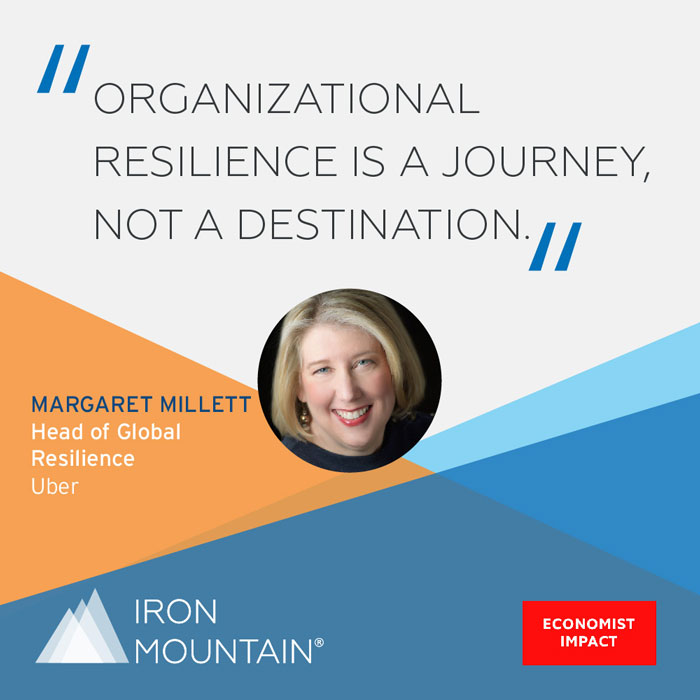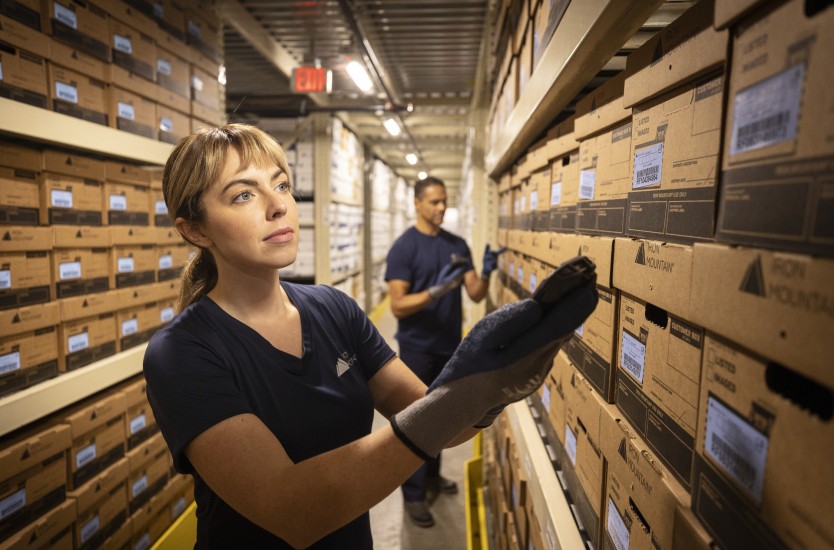Why building organisational resilience is a team sport
Learn why building organisational resilience needs to be a team sport.

The gaps caused by silos organisations, public or private, are complex organisms composed of interdependent parts assembled to fulfill a specific purpose. Yet, businesses often find that these parts operate in silos that cause inefficiencies and create roadblocks to achieving stated goals. The gaps caused by silos were laid bare as organisations scrambled to respond and react to the global COVID-19 pandemic.
Research conducted by Economist Impact sponsored by Iron Mountain in early 2022 was designed to explore global changes in attitudes towards organisational resilience as a result of the significant disruptions caused by the pandemic. Our research found that, prior to the pandemic, fewer than 50% of organisations made cross-functional collaboration a priority. Since the pandemic, a resounding 84% of executives agree that to succeed in creating a sustainable, resilient culture and operations, cross-functional collaboration is essential.
While pre-pandemic IT and Finance were most committed to cross-functional collaboration, they are now joined by functions including supply chain, facilities, human resources, data and information governance, and operations—all of which have played key resilience roles as ways of working shifted to accommodate new business models. To foster an on-going commitment to flexibility and agility, some organisations have created steering committees while others have added an enterprise-wide Chief Resilience Officer. Margaret Millett, Head of Global Resilience at Uber, believes, “Building organisational resilience should be part of everyone’s job.”
7 elements of a sustainable business resilience plan
- Cross-functional collaboration and planning–Operational efficiency
- Information sharing between departments–Data governance & security
- Employee well-being and engagement–Workplace transformation
- Decision-making architectures and measurement–Operational efficiency
- Balancing resilience and efficiency–Operational efficiency
- Adapting to new technology–Data governance & security
- Meeting sustainability targets–Sustainability
While 78% of the research respondents are confident that their initiatives are sufficient to support resilience and continuity in the face of disruption, only 15% involve heads of departments in resilience initiatives. This signals the need for executive leadership to engage in change management to ensure expectations are met at all levels of the organisation. One way to enable a broader commitment to resilience across the enterprise is to create a working team, or steering committee, to assign accountability across functions and drive the process, including developing metrics to measure success.
So, how to make resilience a team sport? According to Economist Impact: “A clear stepping stone to broader cross-functional collaboration is cross-functional planning, which involves assessing and planning for risks across the entire organisation (compared with more functional, risk-specific planning).”

Information-sharing among teams has become more complicated due to hybrid work models. This is where technology can help facilitate improved ways of communicating—76% of respondents note that their organisations are investing in new collaboration and communication tools. The remainder of those surveyed report that significant or much improvement is needed in integrating these tools to promote resilience.
Related: Resilience: Iron Mountain’s point of view
As pressures caused by the pandemic ease, it’s crucial that organisations remain committed to building permanent cross-functional teams able to respond quickly and effectively to disruptors—known and unknown.
For a deeper dive into the Economist Impact research and how you can plan for a more resilient future, explore these resources.

Featured services & solutions
Amplify risk management. Strengthen resilience. Empower your organisation.
Archive, backup, recover and store data with Iron Mountain portfolio of solutions. Minimise downtime and ensure business resilience and continuity.
Resilience reimagined
Are organisations ready to face the next unknown? This report, co-sponsored by The Economist and Iron Mountain, helps to answer that question.
Organisational resilience
Are organisations ready to face the next unknown?
Related resources
View More Resources

